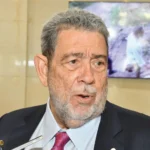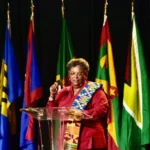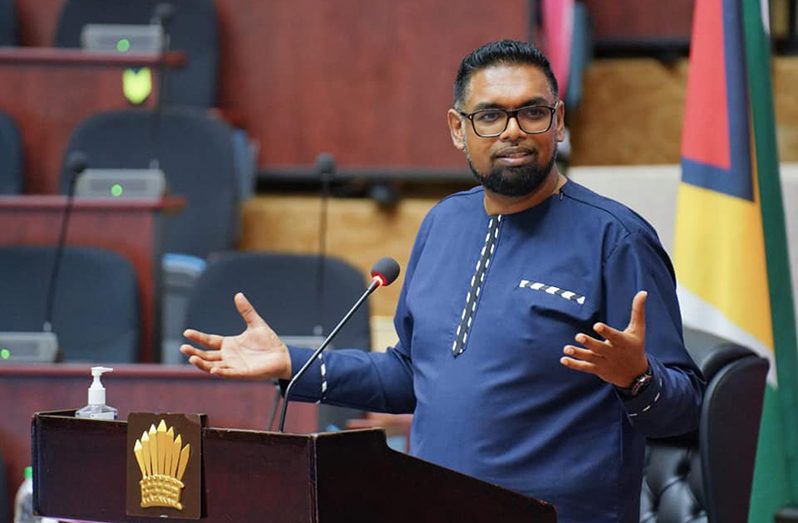(GUYANACHRONICLE)President Ali says collective effort and investment in education drive meaningful change
PRESIDENT, Dr Irfaan Ali has said that the People’s Progressive Party/Civic (PPP/C) recognises the pivotal role education plays in driving societal advancement and the need for continued investment in education for a brighter future for all Guyanese citizens.
The Head of State made those remarks during his address at the commissioning of the state-of-the-art $585 million Abram Zuil Secondary School in Region Two (Pomeroon-Supenaam) last week.
In his address, he outlined the pivotal role education plays in achieving societal transformation, reducing inequality, generating intergenerational wealth, and empowering individuals.
With strategic policies and investments, he said the PPP/C-led government aims to integrate development with tangible results, bringing Guyana one step closer to achieving its educational aspirations and fostering a prosperous society
“Education, people say, is the key to the future…but education has specific features that are linked to socioeconomic advancement and societal development,” the President said.
He acknowledged, however, that having bright and intelligent individuals alone does not ensure societal progress. Instead, it is the collective effort and investment in education that drive meaningful change.
EQUALIZING FORCE
One of the central pillars of the government’s education policy is the concept of education as an equalising force. President Ali expressed his commitment to reducing disparities in access to education and healthcare.
He referenced the “Because We Care” grant, which aims to provide equitable access to educational resources, ensuring that every child has the opportunity to access a quality education.
This initiative was introduced by the PPP/C to offset expenses associated with children attending school. However, this initiative was discontinued by the former APNU regime and was recommenced when the PPP/C returned to office in 2020.
Under the 2023 budget, parents and guardians of 214,000 schoolchildren will now receive $40,000, which amounts to $8.6 billion.
The Head of State also mentioned the “One laptop per family” programme as a means to provide equal access to information and technology.
“The ‘Because We Care’ grant is not just giving the children money and the parents money; it is an equalising force ensuring that access to resources is equitable, to allow them to participate in the educational opportunity. The one laptop per family programme was to ensure that every family had that equalising opportunity to have access to the social good that the country is giving. So, education is a social good — the investments that we are making all across the country,” he said.
The President praised the PPP/C-led government’s efforts in achieving universal primary education, a significant milestone in bridging the gap between urban and hinterland regions. He acknowledged that in the past, the disparity in access to primary education between these areas stood at a staggering 85 per cent.
However, through investments in education, particularly in secondary education, the government aims to realise the promise of universal access to secondary education. President Ali deemed these investments critical and vital to ensuring that every child in Guyana would have access to secondary education.
“Education as an equalising force allows the government to invest across the board, reducing inequality and providing opportunities for access to the social good,” President Ali said passionately.
He stressed that education as an equalising force helps level the playing field and creates opportunities for all children to pursue secondary education, irrespective of their backgrounds.
GENERATIONAL AND INTERGENERATIONAL WEALTH
Drawing on personal anecdotes, President Ali spoke about how parents in Guyana, like billions of others worldwide, never had the opportunities their children have today.
“You will see that all social statistics point to a very important fact that most families transcend out of poverty because of investment in education.
“So, you will see that in the older families that are very large in Guyana, the first three to four children would have to sacrifice to ensure the last two children got an education. And those two children who got the education, utilise the education that they got to take the entire family out of poverty and give the older one that opportunity,” President Ali said.
He highlighted the remarkable transformations occurring within families, as children who receive an education become teachers and change the prospects of future generations. These educated individuals then use their knowledge to uplift the entire family, reversing the cycle of poverty and creating a foundation for intergenerational wealth.
TRANSFORMATIONAL FORCE
President Ali further emphasised education as a transformational force, both at the individual and community levels. He explained that with higher levels of education, people are expected to make better decisions regarding health, family, community, and personal growth. Education contributes to stronger societies by shaping values, perceptions, and analytical ability.
“Education is transformational. It shapes our behaviours, our perceptions, and our ability to analyse and contribute to society. It empowers individuals to make better decisions,” President Ali said with conviction.
The president urged Guyanese to embrace education at all levels, which he believed would contribute to the development of stronger communities and foster robust value systems.
EMPOWERING TOOL
Lastly, President Ali highlighted education as an empowering tool, particularly for women. He lauded the strides women have made in bridging the gender gap through their aggressive pursuit of education.
Noting that women now outperform men at every educational level, he underscored the empowering nature of education and its pivotal role in advancing gender equality.
“Education empowers people. One of the greatest advances women made in bridging the inequality gap was the way in which they aggressively pursued education. Today women are outperforming men at every single educational facility, and that is to show you how empowering education is,” the Head of State said.
The government has allocated $94.4 billion for the education sector this year. Some $12.4 billion of that total has been set aside for the building, rehabilitation, expansion, and maintenance of educational facilities nationwide.










